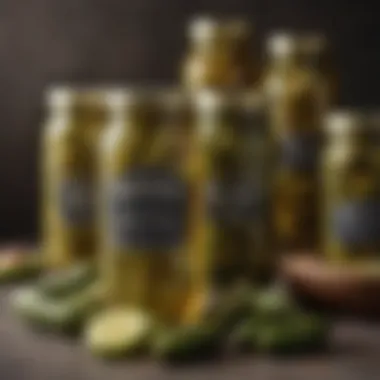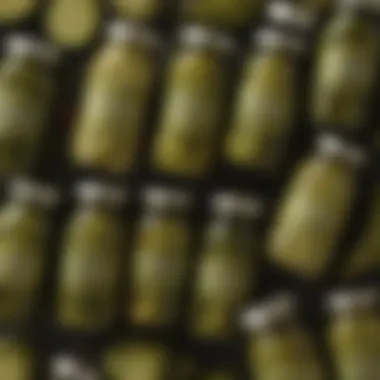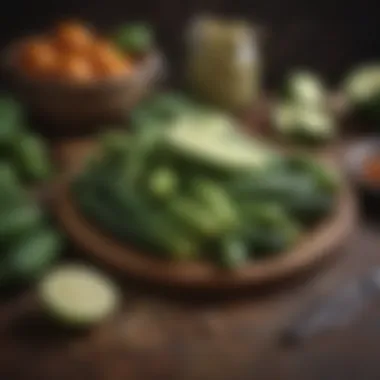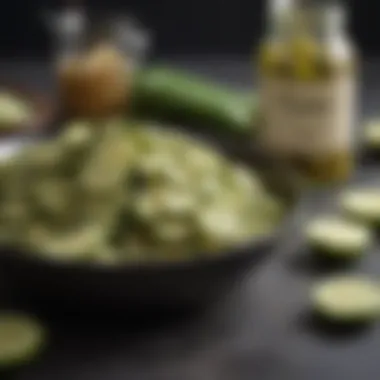Exploring McClure Pickles: A Culinary Journey


Intro
In the world of culinary delights, few subjects astound as much as pickling, a technique that has preserved food for centuries. Among the many artisans within this craft, McClure Pickles stands out as a hallmark of innovation and tradition. Known for their unique flavors and quality ingredients, McClure Pickles takes its place not just on a plate but within a broader cultural tapestry. This article explores the various facets of McClure Pickles, including its history, production methods, and its role in contemporary food culture.
As we journey through the layers of this discerning topic, we will uncover what makes McClure Pickles a significant entity within modern gastronomy. Each section navigates the essence of their creations while reflecting the broader implications of pickling today.
Recipe Overview
McClure Pickles are more than just an ingredient; they embody a culinary experience that speaks to both tradition and modernity. Each jar is filled with cucumbers that are transformed through meticulous pickling processes, resulting in distinct flavors that enhance various dishes.
The origin of McClure Pickles dates back to a family recipe that has been passed down through generations. This rich history contributes to their cultural significance. They do not simply serve as a garnish; they represent a bridge between home cooking and artisanal food production, catering to both local and wider markets.
In addition, pickles from McClure are often used in innovative food pairings and recipes, allowing for versatility that elevates standard dishes - from sandwiches to charcuterie boards.
Ingredients List
The core ingredients of McClure Pickles include:
- Cucumbers
- Vinegar
- Garlic
- Spices, which may vary (often including dill, coriander, and mustard seed)
- Optional sweeteners, such as sugar or honey
Special Ingredient Notes
If one seeks to replicate the McClure Pickles taste at home, consider sourcing fresh, organic cucumbers. The vinegar choice can greatly affect the final taste; apple cider vinegar or white vinegar often provides a nice balance. Additionally, locally sourced spices can lend unique flair to home-made pickles. For those avoiding sugar, using agave or skipping sweeteners altogether can still yield delicious results.
The Origins of McClure Pickles
The journey of McClure Pickles is as rich and layered as the pickles themselves. Understanding the origins of this brand provides insight into the culinary traditions that shaped their recipes and production methods. This section is crucial to appreciate not just the product, but also the story and culture behind it. McClure Pickles is more than just a food item; it serves as a reflection of historical practices and personal narratives that have contributed to the landscape of pickling in America.
Founders and Early History
McClure Pickles was founded by brothers Bob and Joe McClure. Their story begins in Detroit, where they grew up surrounded by a strong food culture influenced by their family heritage. The early years of the company are marked by experimentation in their grandmother’s kitchen. They initially began making pickles as a hobby, inspired by their upbringing and the homemade pickles that thrilled their taste buds.
The vision of the McClure brothers was to create something that echoed their family’s traditional methodology while bringing a modern twist. Their pickles quickly gained popularity among friends and family, and this positive reception served as the impetus for a larger venture. In 2006, they established McClure Pickles as a commercial endeavor, leveraging local farmers’ markets for distribution. Their commitment to quality and authenticity resonated with consumers, cementing their place as a staple in the artisanal pickle market.
Cultural Influences on Recipe Development
The recipes behind McClure Pickles have been shaped by a multitude of cultural influences. The brothers’ Eastern European heritage plays a significant role, particularly through the use of classic pickling spices and techniques that have been passed down through generations. This cultural background not only influences the flavors used but also emphasizes the emotional connection that food can create.
Moreover, the burgeoning craft food movement has directed the development of new recipes and flavor profiles. As consumers began seeking out artisanal products that reflect their values, McClure Pickles adapted by sourcing local ingredients and exploring innovative combinations. The result is a diverse range of products that honor traditional methods while embracing contemporary tastes.
Understanding the Pickling Process
The pickling process is a central element in the world of McClure Pickles. Understanding it provides valuable insights into why these pickles stand out in the culinary market. Pickling is not just about preservation; it involves chemical transformations that impart flavor and texture to vegetables. This process is crucial for enhancing the natural characteristics of the cucumbers used in McClure Pickles.
In essence, the pickling process allows for the transformation of fresh produce into flavorful, shelf-stable items. This transformation can include fermentation, which adds beneficial probiotics, or quick pickling, which is simpler and faster but offers different taste profiles. Each method has its own unique flavor outcomes and also affects the nutritional value of the final product.
By grasping the nuances of pickling, consumers and culinary enthusiasts can better appreciate the complexity behind McClure's offerings. It helps in understanding the effort and skill required to produce products that are not only tasty but also carry cultural significance and history.


Essential Ingredients in Pickling
Essential ingredients in pickling determine the flavor, texture, and safety of the final product. In the case of McClure Pickles, a few key ingredients stand out:
- Cucumbers: The foundation of any pickle, fresh cucumbers are the primary vegetable used. The size and variety influence the crunch and taste.
- Vinegar: Commonly used for its acidity, vinegar acts as a preservative and imparts a distinctive tang to pickles. McClure often uses apple cider vinegar for its natural sweetness.
- Salt: Essential for extracting moisture and enhancing flavor, salt is used in many pickling recipes. It also plays a role in fermentation, if applicable.
- Spices: Dill, mustard seeds, and garlic are often used to create depth of flavor. McClure Pickles has unique spice blends that vary by product.
Each of these ingredients contributes to the overall flavor profile, ensuring that McClure Pickles maintain their reputation for quality.
Fermentation vs. Quick Pickling
The two main methods of pickling are fermentation and quick pickling. Each method has its own advantages and impacts the final product differently.
- Fermentation: This is a traditional method where cucumbers are submerged in a brine solution. The natural bacteria present on the cucumbers convert sugars into lactic acid, which acts as a preservative. This process takes time but yields a distinctive tangy flavor and probiotic benefits.
- Quick Pickling: This technique is faster and involves soaking cucumbers in a vinegar solution with salt and spices. The pickles are ready to eat after just a few hours or days, depending on the recipe. While lacking the depth of flavor produced by fermentation, quick pickles are crisp and convenient.
Both approaches reflect the adaptability of pickling methods. Each has a place in the McClure Pickles canon, appealing to different palates and preferences. Understanding these differences can enhance your culinary experience and appreciation for what goes into each jar of McClure Pickles.
The Range of McClure Pickles Products
Understanding the array of products offered by McClure Pickles is essential to grasp the brand's position in the culinary scene. This array not only showcases traditional pickling techniques but also reflects innovative flavor profiles that appeal to a broad audience. With a focus on quality ingredients and distinctive taste, McClure Pickles provides options that satisfy diverse palates.
Classic offerings serve as the foundation of the brand, while newer, limited-edition items keep the lineup fresh and exciting. Both aspects of their product range underscore the commitment of the company to maintaining the authenticity of pickling while adapting to evolving consumer tastes.
Classic Pickles: Varieties and Flavors
McClure Pickles is renowned for its classic varieties, which include dill pickles, bread and butter pickles, and more. Each type carries a unique flavor profile that contributes to its individual culinary use. The dill pickles, for instance, are known for their crunchy texture and robust sourness, making them perfect for sandwiches or as a side. Conversely, the bread and butter pickles provide a sweet tanginess often enjoyed in salads or as a condiment.
Some popular classic varieties are:
- Garlic Dill: A strong garlic flavor complements the vinegar bite.
- Spicy Dill: Infused with chili, this variety is ideal for those who enjoy heat.
- Sweet and Spicy: This blend of sweet and spicy notes creates a versatile topping for various dishes.
Innovative Offerings: Limited Editions and Seasonal Releases
In addition to its classic pickles, McClure offers limited editions and seasonal releases that captivate food enthusiasts. These products often experiment with unconventional ingredients and flavor combinations, appealing to adventurous eaters. Limited releases are not only a nod to creativity but also a way for McClure to engage with its loyal customer base eagerly looking for new taste experiences.
Examples of innovative offerings might include:
- Seasonal Pumpkin Spice Pickles: A unique fall product that combines sweetness with spice, redefining pickling.
- Smoky Chipotle Pickles: A bold approach incorporating smokiness and heat, ideal for barbecues and gatherings.
These products allow McClure Pickles to expand the definition of what pickles can be and reinforce its position in the market as a leader in creative pickling.
Culinary Applications of McClure Pickles
The culinary applications of McClure Pickles provide a glimpse into how versatile and beloved these pickles can be. Integrating pickles into various dishes enhances flavors and adds a unique texture to meals. Pickling complements the zest of dishes and offers a balance to rich ingredients. Moreover, exploring these applications can elevate the culinary experience, whether for chefs in a professional kitchen or home cooks looking to spice up their meals.
Pairing Suggestions for Chefs and Home Cooks
When it comes to pairing suggestions, the key is recognizing the flavors of McClure Pickles. Their robust acidity and crunch can balance out heavier dishes or enhance lighter options. For example, pairing them with grilled meats can create a refreshing contrast, while their zing can elevate simple snacks like cheese boards. Understanding these possibilities allows culinary creators to innovate, offering new experiences in taste and presentation.
Incorporating Pickles into Recipes


Sandwiches
Sandwiches are one of the most popular ways to integrate McClure Pickles. The strong, tangy notes of these pickles contrast nicely with the flavors of meats or spreads. This makes them a beneficial choice for anyone looking to elevate their sandwich game. A classic deli sandwich topped with pickles brings richness and depth to every bite. Using McClure Pickles provides a distinctive kick that can turn an ordinary sandwich into something unforgettable. However, one must consider balancing flavors, as too many pickles can overwhelm.
Salads
Salads benefit greatly from the inclusion of McClure Pickles as well. Adding pickles to salads introduces a crunchy element while giving an extra layer of flavor. Their acidity can brighten up heavier dressings, creating a well-rounded dish. Salads featuring pickles can still be healthy but with a twist. This choice enhances the overall appeal and gives life to otherwise standard combinations. An important note is that one should use the right quantity, as too many pickles can overpower the fresh tastes of vegetables.
Appetizers
The use of pickles in appetizers is widespread due to their versatility. McClure Pickles can be used as a garnish for dips or served alongside charcuterie boards. The crispness of pickles adds an exciting texture to spreadable cheeses and cured meats. Their unique flavors inspire creativity, making them an excellent choice for hosting. However, cuisines should consider the potential flavor clash with some appetizers, ensuring they align with the overall theme.
"Pickles have a way of enhancing culinary creations, offering just the right amount of acidity and crunch to diverse dishes."
Overall, McClure Pickles play a significant role in culinary creativity. Their applications in different dishes showcase their ability to complement and elevate traditional flavors, providing a fresh twist for food lovers.
McClure Pickles in Contemporary Cuisine
The relevance of McClure Pickles in contemporary cuisine can be seen through its artistry and commitment to quality. These pickles are not simply accompaniments but serve as a versatile ingredient that enhances a wide variety of dishes. Their presence in modern gastronomy reflects a growing appreciation for artisan food products and a revival of traditional preserving techniques.
The Rise of Artisan Pickles
The popularity of artisan pickles has surged in recent years. Consumers are increasingly drawn to small-batch producers like McClure Pickles, who focus on craftsmanship while ensuring flavor depth and ingredient integrity. Artisan pickling stands out because it often emphasizes local sourcing, unique flavor combinations, and innovative methods. For instance, McClure’s embrace of both classic and experimental varieties appeals to food enthusiasts who seek authenticity in their culinary experiences.
- Flavor Diversity: McClure Pickles offers a range of flavors that cater to a broad palate, from dill to spicy options, reflecting regional tastes.
- Culinary Versatility: Beyond serving as a side dish, these pickles can elevate dishes, from gourmet burgers to charcuterie boards, showcasing their adaptability.
Artisan pickles are also a conversation starter; their unique flavors and textures encourage sharing and experimentation in culinary settings.
Sustainability and Local Sourcing
Sustainability in food production is crucial today. McClure Pickles reflects this trend by prioritizing local sourcing of ingredients. This not only supports local farmers but also reduces carbon footprint associated with transportation. By opting for fresh, locally produced cucumbers and spices, McClure ensures the highest quality while fostering community ties.
- Ethical Practices: The company's commitment to sustainable practices resonates with consumers who are becoming more health-conscious and environmentally aware.
- Quality Assurance: Local sourcing often leads to fresher and more flavorful ingredients, enhancing the overall taste of the pickles. Consumers are more likely to appreciate products made with care and responsibility.
"Supporting local agriculture not only enriches the flavor profiles of our pickles but also nourishes the community."
– McClure Pickles Team
As food lovers increasingly consider the origins of what they consume, McClure Pickles serves as an example of how contemporary cuisine can align with values of sustainability and community engagement. The blend of tradition and modern ethics offers a flavorful exploration of pickling that excites palates and conscience alike.
The Cultural Significance of Pickling
The practice of pickling transcends mere culinary technique; it embodies a spectrum of cultural narratives and historical legacies. Understanding the cultural significance of pickling reveals how this art form has shaped identities, traditions, and communal ties through generations. It is especially vital in the context of McClure Pickles, as their products are not just preserved cucumbers but part of a broader tapestry of food culture.
Historical Roots of Pickling Practices
Pickling dates back thousands of years, with roots traced to ancient civilizations such as Mesopotamia and Egypt. These early communities discovered that immersing food in brine or vinegar could preserve it, ensuring sustenance during scarce months. The historical significance goes beyond survival; pickling methods often reflected societal norms, available resources, and even migration patterns. For instance, as communities moved, they brought their recipes, creating a mosaic of pickled delicacies that still exists today.
Various regions developed unique pickling techniques and flavors, influenced by local ingredients and cultural preferences. In Eastern Europe, for example, pickles often accompanied traditional dishes, enhancing meals and highlighting regional tastes. This practice served as a connection to heritage, providing a sense of belonging through shared flavors and culinary experiences.
In many cultures, the act of pickling represents not just preservation but a bonding ritual. Families often gather to prepare pickled foods during seasonal harvests, an activity that strengthens intergenerational ties.


Global Perspectives on Pickled Foods
Today, pickling is a global phenomenon, manifesting in diverse forms across cultures. In Asia, kimchi, a staple in Korean cuisine, combines various vegetables with spices. The fermentation process creates complex flavors and is often regarded as a health food as it fosters gut health. Similarly, in Japan, pickles, known as tsukemono, play a central role in the diet, where they are both flavorful and visually appealing.
In the United States, the popularity of pickles has surged in recent years. McClure Pickles exemplifies this trend, as their artisanal approach resonates with contemporary consumers seeking authenticity and quality. American pickling has branched out, incorporating influences from various ethnic traditions, thus enriching the culinary landscape. This blending of styles showcases an appreciation for heritage while encouraging innovation.
Pickling also extends to social and economic dimensions. In farmer's markets and local food movements, small businesses dedicated to artisanal pickling play a vital role in promoting sustainability. They emphasize the importance of sourcing local ingredients, which is both an environmental and ethical consideration in today’s food culture.
"Pickling is not only about the preservation of food; it is also about preserving history, culture, and community identity."
The global perspective on pickled foods illustrates how this practice is an evolving narrative. As people travel and connect across borders, the appreciation for diverse pickled goods deepens, providing a rich avenue for exploration and understanding of cultural differences.
In summary, the cultural significance of pickling stands firmly at the intersection of history, community, and innovation. For McClure Pickles, this significance is interwoven into their product offerings, which capture tradition while inviting contemporary culinary enthusiasts to partake in a timeless practice.
Consumer Reception and Brand Development
Understanding consumer reception and brand development is crucial for any culinary business, including McClure Pickles. This section examines how the brand connects with its customers and what strategies are employed to foster loyalty and engagement. The importance of this topic lies in the way it showcases the evolving relationship between a food product and its consumers, especially in a market that values authenticity and quality.
Market Positioning of McClure Pickles
McClure Pickles has effectively established its market position through a focus on superior quality and authentic flavors. The brand appeals to both gourmet enthusiasts and everyday consumers, creating a broad customer base. By using local ingredients and traditional methods, McClure enhances its image as a premium pickling brand. This positioning is not just about the product but also extends to the narrative associated with pickles. McClure emphasizes the artisanal nature of its pickles, which attracts food lovers looking for unique tastes.
Their pricing strategy reflects this market positioning. While McClure Pickles may be priced higher than mass-produced options, the perceived value is justified by the quality and attention to detail. This attracts consumers willing to pay for innovation and tradition in their food choices. Additionally, McClure's distinct flavors and seasonal offerings keep the brand fresh in consumers' minds, encouraging repeated purchases and widening its appeal.
Community Engagement and Brand Loyalty
Building community engagement is integral to McClure Pickles' brand development. The company actively fosters relationships with local farmers and the broader community. This commitment not only supports sustainable practices but also resonates with consumers who prioritize local sourcing. Such initiatives build goodwill and a sense of belonging, essential for cultivating brand loyalty.
McClure Pickles engages with its audience through various channels, including social media platforms like Facebook and Reddit. Sharing recipes, product uses, and the stories behind their products creates a connection with consumers. Here, customers become part of the brand narrative, increasing their likelihood of advocacy.
Maintaining customer loyalty includes collecting feedback and adapting to consumer preferences. McClure is attentive to emerging dietary trends, like veganism and gluten-free options, ensuring that their product line reflects evolving needs. These proactive steps not only enhance customer satisfaction but also reinforce their reputation as a trustworthy brand that cares about its consumers.
"A successful brand connects its narrative with the values its community holds dear, fostering loyalty in return."
Future Trends in Pickling
The future trends in pickling reveal how this age-old preservation method continues to evolve. As food culture shifts and dietary preferences change, pickling is not only adapting but expanding its boundaries. The emergence of innovative flavors and accommodating dietary trends shapes the market. McClure Pickles stands at the forefront of these developments, making it essential to understand these trends for both consumers and producers alike.
Innovations in Flavor Profiles
Innovations in flavor profiles are a significant component of modern pickling. McClure Pickles has embraced this by experimenting with unusual ingredients that appeal to a broader audience. For example, the introduction of seasonal variations such as spicy dill or sweet pickle recipes introduces complexity. Beyond the traditional vinegar and salt, new ingredients like kombucha bases and fruit extracts create a dynamic flavor spectrum.
- Unique Combinations: Many brands are blending unexpected spices, such as garlic, turmeric, and even citrus fruits. This leads to a diverse range of tasting experiences.
- Fermented Varieties: There is also a rise in fermented pickles, which offer probiotic benefits while adding depth to the taste. This method highlights the balance between health and flavor.
Ultimately, these innovations not only cater to adventurous palates but also encourage consumers to experiment in their own kitchens. This exploration contributes to a broader understanding of what pickles can be across various cuisines.
The Impact of Dietary Trends on Pickling Practices
The impact of dietary trends is reshaping the landscape of pickling practices. More individuals are adopting specific diets, such as vegan or gluten-free trends, influencing product development. McClure Pickles has recognized this change, ensuring that their offerings align with contemporary dietary needs.
- Health-Conscious Choices: As people focus on health, the demand for low-sodium and organic options grows. McClure Pickles has responded by crafting products that maintain flavor without compromising health benefits.
- Plant-Based Appeal: With plant-based diets on the rise, there’s an increased interest in pickled vegetables not just as side dishes but as central components of meals. For example, pickled beets or cucumbers are now featured prominently in salads and grain bowls.
"The resurgence of interest in all things fermented and pickled correlates closely with the global trend towards health-conscious eating."
Understanding these shifts is vital for any business in the culinary world. The pickling sector not only reflects dietary changes but also embraces them, ensuring relevance in a rapidly evolving market.



